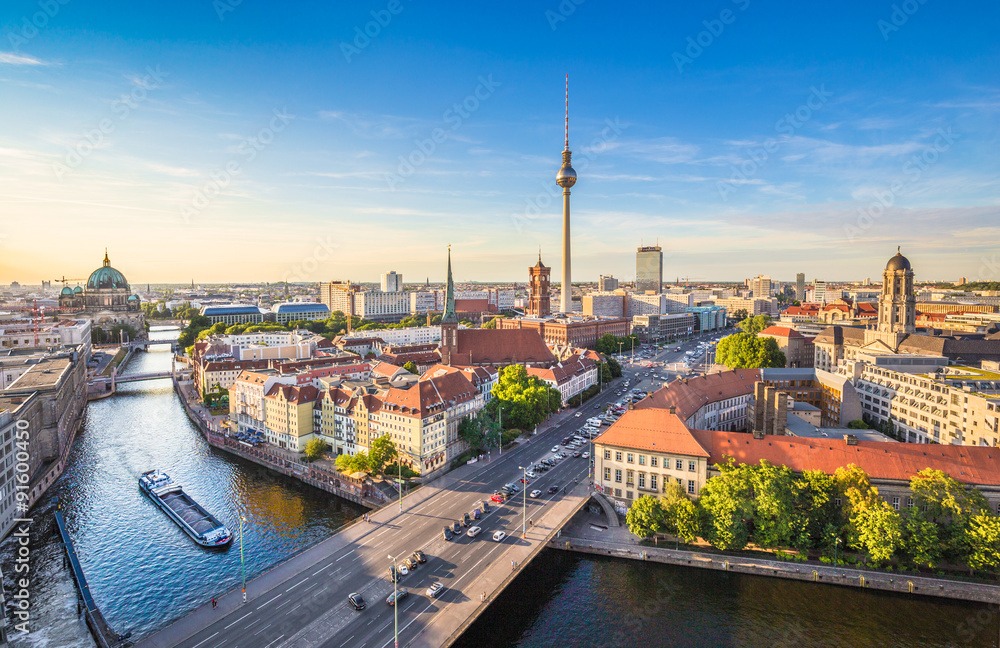As it transitions from its legacy position as the engineering powerhouse of Europe to a leader in digital tech, Germany is trying hard to attract skilled foreign workers—especially in tech.
And not just engineers: workers are needed in marketing, data analytics, design, and other fields. Speaking German is not necessarily a prerequisite, as many companies with international customers speak English in the office.
Germany offers vibrant tech hubs in its major cities, including Berlin, Hamburg, Munich, and Frankfurt. Tech jobs in Germany typically pay relatively well, too, and as a bonus, the Germans have their work-life balance in good order!
An example: we’re CareerFoundry. We’re based in Berlin, but our working language is English. We’ve trained thousands of English-speaking internationals to find tech jobs in Germany, Europe, the U.S., and beyond. So we know it’s possible! (Check out our free 5-day short courses in UX, product design, data analytics, and more here.)
Whether you live here already or are considering relocating, let’s navigate the particulars of tech jobs in Germany, including:
- How to find a tech job in Germany
- Tech jobs in Germany’s biggest cities
- Top 10 tech jobs in Germany
- Final thoughts
Ready to dive in? Let’s read on.
1. How to find a tech job in Germany
Here’s our step-by-step guide to finding tech jobs in Germany.
Step 1: Define your area of expertise
If you’re not yet working in the tech industry, it’s time to brush up on your skills. From software development and IT security to data analysis and machine learning, your options are diverse.
We recommend checking out free online tutorials (on YouTube, for example) to get a feel for the different areas. You can also take a tech career quiz to narrow your options.
Interested in UX? Check out our guide to UX in Berlin.
Here at CareerFoundry, we offer top-rated certifications in several tech fields. We are based in Berlin, so our network in Germany is wide. Check out our courses here.
Step 2: Consider the practicalities of relocating
Some tech jobs in Germany are remote, but it’s more of an adventure to move somewhere new! Of course, this comes with additional considerations.
Fortunately, many companies offer relocation support for the best-paid roles. When applying for jobs, be prepared to negotiate a relocation package.
Don’t forget to factor the varied cost of living in any salary negotiations. Tech salaries in Germany may not stack up to those in San Francisco, for example, but they may be much higher than tech jobs in other locations. Tools like Numbeo or Expatistan can help compare living costs in German cities.
Step 3: Explore your visa options

If you’re not an EU citizen and moving specifically for work, companies will most likely have to sponsor your visa. Well-resourced startups and larger organizations will do this for you if you’re hired—and take care of the paperwork!—so it’s worth remembering this when you’re applying for jobs.
The Blue Card visa comes with the most privileges, so if you can, you might want to try and negotiate the necessary salary to qualify for this one!
If you’re serious about moving to Germany, you have several options depending on your circumstances:
- General work permit: If you’ve found a job in Germany that can’t be filled by an EU national, apply for this permit. No special skills are required, but you’ll need to be qualified for the job. Examples include specialized technical roles, language-specific positions, or jobs with specific local market knowledge.
- Highly-skilled worker permit: This is the best option for highly experienced professionals with a high income. Examples might include senior software engineers, medical specialists, research scientists, or corporate executives with unique expertise.
- EU Blue Card for Germany: If your annual salary will be at least €56,400 (or €43,992 for occupations where there is a national shortage, such as engineers, IT specialists, and certain skilled trades) this is the option for you.
- Work permit for freelancers: Freelancers can apply for this permit, but you’ll need to demonstrate that you have a feasible client base in Germany.
- Freedom of movement (EU Citizens): If you’re already an EU national, you’re covered by freedom of movement and won’t need a visa. However, you’ll still need to complete certain administrative tasks, such as registering your residence, obtaining a residence certificate and health insurance, and complying with other applicable regulations.
You can start the visa application process by visiting the German embassy in your home country and providing the required documents. Learn more from the German Embassy website.
Step 4: Improve your language skills
Many tech companies in Germany operate in English, meaning you don’t necessarily have to learn German to thrive. In most cases, though, German language proficiency will enhance your job prospects and boost progression opportunities.
Consider taking a German language course. You can start with free online resources or language learning apps like Duolingo or Babbel (based in Berlin!). Be aware that Germany offers so-called “Integrationskurse” (integration courses) partially funded by the state, so there’s no reason not to improve your German!
Step 5: Research tech job boards and websites
Now we’ve covered the practical “moving to another country” stuff, let’s look for real tech jobs in Germany!
Germany has many jobseeking platforms, including well-known sites like LinkedIn, Totaljobs, Glassdoor, and Indeed. StepStone is another popular jobseeking website in Germany.
However, if you know what role you’re looking for, many of the smaller, more targeted sites, such as GermanTechJobs, Landing.Jobs, Relocate.me, and Jobtensor focus specifically on tech roles. While they typically have fewer listings, they do make it easier to find relevant opportunities.
Step 6: Focus on big cities
You’ll find the largest concentration of tech jobs in Germany in the capital, Berlin. You’ll also find opportunities in larger cities like Hamburg, Munich, and Frankfurt.
In short, while there are tech jobs in Germany’s smaller cities, keep in mind that the majority are available in larger metropolitan areas.
Step 7: Network
If you’re already living in Germany, attending conferences or networking events is one way to cut through the digital noise of online job-seeking. At these events, you can connect with employers and tech professionals and even spot job opportunities before they go online.
Never underestimate the power of community connections. While not every contact will lead to a job, keep those contacts warm, and you never know where they’ll lead.
If you haven’t made it to Germany yet, LinkedIn and Xing (Germany’s answer to LinkedIn) are great alternatives for connecting with potential employers.
Step 8: Apply to startups and recruitment agencies
It’s easy to find jobs listed online. But it’s easy for everyone else, too!
Narrow the gap between you and the competition by applying to companies directly. Make a list of startups in your chosen area and reach out.
Specialist tech recruitment agencies are also an option and can be great for matching you with suitable job opportunities. Acelr8, Headmatch, and Skipsearch are just three you might want to explore, but try researching agencies in your preferred location, too.
Step 9: Build an online presence
Build your online presence via social media, business networking sites, or tech-specific communities like GitHub or Stack Overflow.
A portfolio that highlights your best work can help. Depending on your skill area, that might be a UX design project, an app you’ve developed, content you’ve written, or websites you’ve created.
Whatever your achievements, this is your chance to showcase them. Use this opportunity to point out your language skills, too. Or—if you don’t speak German yet—highlight any experience you have working in cross-cultural or multilingual environments.
Step 10: Interview prep!
Hopefully, by this stage, you’ll have landed an interview or two! That’s great, but your work isn’t finished!
Research the company, and its products or services, and be ready to discuss how your past experiences make you ideal for the role you’re applying for. You might also be asked about your motivation for moving to Germany, so have a clear answer prepared.
Finally, depending on the role, be ready for technical interviews and assessments. Many tech jobs use “whiteboard tasks” or coding challenges to test your skills, so you’ll need to be well-versed. Use platforms like LeetCode or HackerRank to practice for technical interviews.
Related reading: 35 job interview questions (and answers!)
2. Tech jobs in Germany’s biggest cities
Each of Germany’s biggest cities has its own unique ecosystem and industry focus.
One thing to keep in mind: while the example tech jobs covered in this section pay well compared to many careers in Germany, they probably can’t compete with salaries in major Western tech hubs like San Francisco, New York City, or London. However, for many, the trade-off is worth it for the unique experience of working in a different country with a lower cost of living (compared to these hubs), discovering an exciting new culture, and enjoying a better work-life balance. First, let’s pay a visit to…
Berlin

In recent decades, Berlin, Germany’s capital and largest city, has transformed from a symbol of Cold War division to a thriving metropolis and tech hub. The first startups sprung up here in the late 2000s, and the city has since attracted tech innovators in droves.
Besides startups, Berlin is also home to renowned tech giants, including SAP, Siemens, and Deutsche Telekom, to name a few. Many industries here also revolve around fintech and e-commerce, so you’ll find no shortage of tech jobs.
There’s a reason that Berlin’s unofficial motto is “poor but sexy”—the cost of living has been historically low and is still low compared to many other Western capitals, so keep this in mind when looking at the salaries. But this is rapidly changing, and housing is harder and harder to find, so get in while you can.
We’ve used the salary comparison tool, PayScale, to get a feel for how much you could earn for different tech jobs in Berlin. Obviously we can’t list all the available roles, but we’ve handpicked a select few that you can compare across Germany’s different cities.
Here are the average annual salaries you can expect for the following roles:
- Software engineer: €58,000
- UX designer: €40,000
- UI designer: €38,000
- Data analyst: €47,000
- Full-stack web developer: €50,000
- Digital marketing manager: €42,000
Remember, these are just the median salaries, too, so you have the potential to earn much more!
Want to do some tech job networking in Berlin? Check out:
Hamburg

Germany’s second-largest city, Hamburg, is nicknamed the “Gateway to the World” due to its historic and present role as a major international port. But this shouldn’t diminish Hamburg’s increasing tech presence, especially in the logistics industry.
Once again, we can turn to Payscale to get a feel for the average tech salaries in Hamburg. Although other roles are available, to make an easy comparison with Berlin, here are the median salaries for the same roles we looked at in Berlin:
- Software engineer: €55,000
- UX designer: €40,000
- Data analyst: €46,000
- Full-stack web developer: €50,000
- Digital marketing manager: €48,000
As you can see, Hamburg’s salaries are pretty comparable to Berlin’s, but of course, it will depend on which tech roles are highest in demand in your industry.
When networking in Hamburg, keep an eye out for:
Munich

Moving further south, we find ourselves in Munich, perhaps best known for the world-famous Oktoberfest. For those in the know, it’s also renowned for its focus on industries including mobility and automotive technology. Munich is also home to the Big Five tech giants—Amazon, Apple, Google, Microsoft, and Meta all have offices here—and many startups.
According to Payscale, here are the average salaries for the following tech jobs in Munich:
- Software engineer: €54,000
- UX designer: €41,000
- UI designer: €49,000
- Data analyst: €54,000
- Full-stack web developer: €51,000
- Digital marketing manager: €59,000
If you’re looking for tech jobs in Munich, some opportunities to consider include:
Frankfurt
Last but not least, the smallest city on our list: Frankfurt. But don’t let its size mislead you! As Germany’s financial capital and one of the largest financial hubs in Europe, Frankfurt is home to a booming fintech sector. It hosts numerous consultancy services including Capgemini and Tata, for which tech lies at the heart of their business models.
According to Payscale, these are the median salaries for the following roles in Frankfurt:
- Software engineer: €53,000
- UX designer: €49,000
- UI designer: €45,000
- Data analyst: €50,000
- Full-stack web developer: €52,000
- Digital marketing manager: €70,000
Remember: being a financial hub, fintech jobs are big business here and many companies will offer seductive performance bonuses on top of your base salary.
Some tech events you might want to attend in Frankfurt include:
3. Top 10 tech jobs in Germany
We’ve pored through numerous tech job listings on sites like Indeed, along with German-specific industry resources like tech-careers.de and Jobtensor to get a sense of the most in-demand IT and tech roles available in Germany.
Here’s our handpicked top ten available tech jobs in Germany:
1. Web developer
Web developers, sometimes known as front-end or back-end developers, or full-stack developers, are responsible for coding and maintaining websites. They typically work with various programming languages—whether JavaScript, Python, or another language entirely—and their associated frameworks. Most developers are also involved in mobile and web app development, too, creating apps for iOS, Android, and other platforms.
If you’re interested in a career in web development, consider checking out CareerFoundry’s Full-Stack Web Development Program.
2. DevOps Engineer
DevOps engineers, or DevOps specialists, work at the intersection of software development and IT operations (hence the name!) In this role, you’ll help streamline software development, deployment, and maintenance, ensuring that software products are delivered quickly and at high quality.
This is a role that is in high demand in Germany, where the huge shortage of skilled IT workers is impacting the delivery of software solutions in numerous industries including technology, and digital media.
3. Network engineer / system adminstrator
Network engineers, also known as network or system administrators, maintain the computer systems that can underpin an organization’s entire operation. As many German companies modernize their tech infrastructure, this is another role that’s in high demand.
Network engineers work with various networking technologies, such as routers, switches, and firewalls, to ensure their networks are stable and secure. They find employment in most sectors, but tech and finance, in particular, rely on effective network engineers.
4. Data analyst/ data engineer
Data analysts or data engineers, variably known as business intelligence analysts or data viz specialists (among other titles), collect, process, and interpret data and build systems to manage dataflows.
Data analysts work in various industries, from marketing to finance and even sports. However, they’re most often employed by companies looking to optimize their operations or identify revenue opportunities.
Interested in a career in data analysis? Check out CareerFoundry’s Data Analytics Program, which covers all the tools and techniques you need to get started.
Or watch this video about whether a career in data analytics is right for you:
5. Cloud architect
Cloud architects, cloud engineers, or solutions architects, design, develop, and manage cloud-based platforms. In this role, you’ll work with cloud-based tools like Amazon Web Services (AWS), Microsoft Azure, or Google Cloud to create solutions to large-scale data management problems.
Since most companies in Germany use multiple cloud providers, the demand for tech professionals who manage these structures is only growing. Most cloud architects are employed in industries like manufacturing, financial services, automotive, logistics, and supply chain management.
6. Product manager
Not all product managers work in the tech industry, but those who do are usually responsible for guiding the development of software products and services.
As a product manager, you might not get hands-on in development tasks, but you will work closely with cross-functional teams of engineers, developers, designers, and marketers to ensure products are delivered on time and that they meet user needs.
If product management sounds right for you, CareerFoundry’s Product Management Program will upskill you in everything from wireframing to roadmapping and people management.
7. UX/UI designer
User experience (UX) and user interface (UI) designers play a vital role in creating user-friendly and visually appealing digital products.
In this role, you’ll work closely with product teams to ensure that websites, apps, and other interfaces are easily navigable and meet users’ needs.
While UX and UI design are slightly different roles, there’s plenty of overlap, and the two often collaborate.
If you’re interested in pursuing a career in UX/UI design, consider the CareerFoundry UX Design Program or UI Design Program.
8. Cybersecurity analyst
Cybersecurity analysts, sometimes known as information security analysts, protect information systems from cyber threats—a growing problem in Germany and beyond. Cybersecurity experts typically monitor networks, systems, and apps for security issues, alongside investigating external threats and data breaches.
Cybersecurity analysts are vital for any industry working with confidential data. As you can imagine, there’s no shortage of work to be found here!
9. Artificial intelligence/ machine learning engineer
Unsurprisingly, artificial intelligence (AI) and machine learning (ML) engineers are in hot demand in Germany right now, thanks to the massive and global growth in AI. Responsible for designing, developing, and implementing AI and ML algorithms, you’ll find yourself solving complex problems and improving decision-making in this role.
Industries from automotive and healthcare to finance and manufacturing all employ AI and ML engineers. You might find yourself working on anything from developing software for self-driving cars to improving medical diagnostics or enhancing financial risk assessment models.
10. Games developer
Perfect for those who want to blend tech with creativity, game development is on the rise in Germany. In 2019, the German federal government launched a computer games funding program, offering up to 50 million euros a year to support the country’s games sector.
Games developers typically create games for various platforms, from proprietary consoles to computers and mobile devices. The role can involve all aspects of the game creation process, from design to coding and testing.
Related reading: The best entry-level tech jobs (you can get with no experience)
Final thoughts
While Germany’s major cities—from Berlin to Hamburg and Munich—are home to the biggest tech giants, we recommend finding your first job with a startup if possible. Startup jobs are often easier to come by, and due to their fast-paced, hands-on nature, you’ll get more experience in a wider range of areas, helping you build skills and gain insights into which areas interest you. But that’s not a hard rule!
Want to find out more about changing to a career in tech? Read the following guides:
- The Tech Career Quiz: Which job is right for me?
- How to get into tech (with little to no experience)
- The 10 best paying jobs in technology
